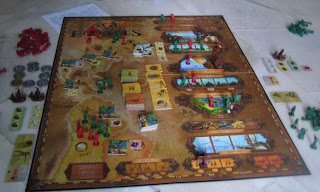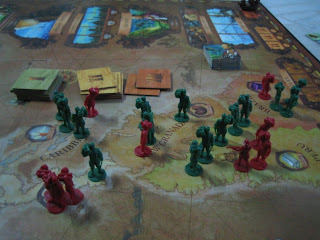I have now played two games of Age of Empires III, both as two-player games against Michelle, on 1 and 2 Dec 2007. Age of Empires III is one of the hot new games this year. Although licensed with the PC game of the same name (there is no Age of Empires or Age of Empires II boardgame), this game is a true Eurogame in gameplay. Many people say that it is just a rehash of mechanics used in other Eurogames - worker placement of Caylus (but Glenn Drover has already designed this mechanism before Caylus came out), area majority like El Grande, and special buildings like Puerto Rico. However I (and many others too) do not find this a problem, since the game is good. It is quite "Euro" indeed, but it doesn't feel so similar to another game that I feel it has nothing new to offer.
Age of Empires III is a game about discovery, colonisation, trade (in a more abstract way than other aspects), development, and a little warfare. You score victory points (yes, the staple in Eurogames...) from how many new lands you discover, how well you did in colonising the new lands, the earning power of your trade empire, and from special buildings that you construct. There are many things that you can do, but you are competing with your opponents to pick these actions, which are limited. You not only compete to do the actions, but also compete to be the first player to do the actions, because in most cases, being the first to do an action is advantageous. To choose to do an action, you place your colonist into the appropriate space on the board, i.e. "the worker placement" mechanism. Everyone takes turns to place colonists, and when that's done the actions are performed in a fixed order. That's basically how the game works.

Now, what actions to choose is the juicy part. You can spend people to discover new lands. You may or may not succeed, depending on whether your expedition force can overcome the (always hostile) natives. You can send people to colonise the already-discovered new lands. You can collect trade goods, which represent your trade empire, and are an important source of income. This is handled in a simple and abstract way, but it is fine for me. You try to collect sets of 3 or 4 trade goods. A set of 3 trade goods of different types gives you $1 per round, a set of 3 of the same type gives $3 per round, and a set of 4 of the same type gives $6 per round. There is an action which you can use to select a trade good from a group of four randomly revealed at the start of a round. When you are the first to establish a size-3 colony in the Americas (North, Central, South and the Caribbean too), you also collect the trade good from there, e.g. silver in Peru, fish in New England. You can also compete for the merchant ship (only one available per round), which is basically a joker.

You can pay to construct buildings. Buildings from the Age I and II usually give you special powers, e.g. giving you a free missionary every round, which may steer your strategy. Buildings from Age III are usually victory point earners, depending on a certain aspect of your empire, e.g. how many regions you have colonised. Obviously, turn order is important if you want to choose the good buildings, so turn order is also something that you can compete for.
Warfare is simple. You need to spend a person to declare a battle or a war against another player. Battles are free but occur only in one region. All soldiers belonging to you and your "target" opponent kill one enemy piece. Full stop. No dice rolling, no looking up reference tables, no card play. Wars are expensive. You pay $10, and battles occur in every region where you and your "target" opponent have people. In my two games against Michelle, there was no warfare. Almost had it, but didn't happen eventually.

Before I played the game, I was a little skeptical whether I would find it boring, since I kept hearing that it was just a rehash of mechanics from other games. I heard a lot of good things about it too though, and I downloaded and read the rules. Eventually I decided to buy it. The game surprised me in that I enjoyed it more than I expected. I found it quite well balanced. My earlier worry about the luck factor in discovery turned out to be less an issue than I thought. When attempting a colonisation, you commit a number of men, and then flip over a tile (or card). If the number of natives is more than your men, you fail and lose all your men. If you succeed, you claim the discovery tile and put a colonist in the newly discovered region. The two possibilities of bad luck are (a) you commit many men, but discover a lousy region of only two natives, wasting many of your men, and (b) you commit many men, but discover a horrible region of too many natives, wasting all your men, and you get nothing in return. After playing the game, I found that discovery is just one aspect of the game, and the luck factor does not dominate. It can set you back, but it is all about risk and reward. The more men you commit, the less risk you have.
One thing that also surprised me is that the game is good with two players. I had thought there would be too little competition. It turned out that we had enough competition for the game to be interesting. We did indeed have much more freedom to explore different strategies, but the competition level was not poor like I thought it would be.
I feel very comfortable playing the game. There are different approaches to try and to choose from. There are different types of actions to choose from, but the permutations are not as complex as Caylus. I guess you can say games of Age of Empires III will not vary as much as Caylus from game to game, but there are enough moving parts and different aspects of the game to keep things interesting. The game flows very smoothly, and you don't feel there is nothing useful you can do with your people. There is some luck in the game, in discovery, in what kind of trade goods get revealed at the start of a round, in the buildings that become available. I don't mind these too much. The buildings may be a significant factor in deciding who wins or loses, for players of equal skill, but in this situation I would use my usual argument - if the players played equally well, then they would have enjoyed the process of playing the game, of competing, of maneuvering and positioning themselves to make the most of the buildings that appear in Age III. So, if you lose because the building that you are hoping will appear does not appear, then just accept your poor luck gracefully, and congratulate your opponents for their better luck with good humour.
In my two games against Michelle, I mostly chose the colonisation and discovery paths. I got the buildings that gave me extra colonists or missionaries (who give you an extra colonist when they settle in the new world). I scored many points for my presence in the new world. Michelle pursued a trade goods path, building a very impressive trade empire. She had the benefit of more people, and going second, so it is risky for me to try to compete for the merchant ship (the joker trade good). If I placed a man there, she could immediately place one of hers there, and she could always outnumber me if she wanted to, because her turn was after mine, and she had more people to place than I did. So, I "let" her win many merchant ships cheaply, with just one man. In fact, I only dared to try to claim a merchant ship when I saw that she already had so many that she couldn't make use of another additional one.



Michelle took some buildings that gave her extra soldiers. These buildings are quite good. Firstly having an extra person gives you more flexibility in placing your people. More choices. Soldiers who are used for discovery can earn you money, depending on whether there is much to plunder in the newly discovered region. Lastly, soldiers that you send to the colonies can be used for warfare, or as a deterrent. Michelle almost declared a battle on me. Thankfully in that round I built the Indian Allies "building", which allowed me to place two soldiers in the region where Michelle had originally planned to attack me. So, when it came to time for battle, she cancelled her plans (and wasted one man), because following through with the battle would have made things worse for her. I had two soldiers there when she only had one. That was an expensive way to prevent a battle and secure my dominance on just that one colony.
I won both games. The first one was quite close, and I only won because of the accumulated victory points from my dominance in the colonies. The second one the score was further apart. Michelle's trade empire didn't work out as well as her first one.
2 comments:
Hey Hiew
I am thinking of getting AOE3 mainly for my wife and me to play 2P games, so I was wondering how long your 2P games took on average?
- Frank
Hi Frank,
I don't remember exactly, but I think our first game took maybe 1 hour 20 minutes, and once we were familiar with it, the game took us around 1 hour to play, or maybe slightly more. It feels quite quick.
Post a Comment